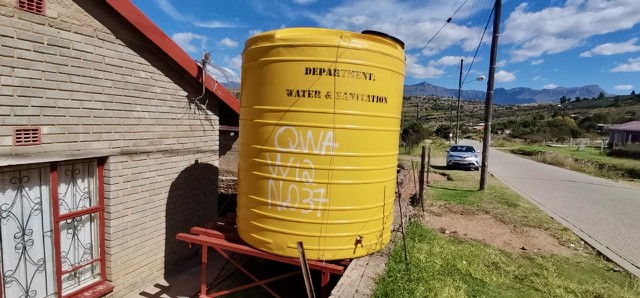No water in Qwaqwa villages since 2018
Villagers battle to access water, yet government says R220 million supply project is far advanced
To help villagers in Qwaqwa where taps have run dry, 1,400 out of 2,000 tanks have so far been delivered. Photo: Yamkela Mopeli
- Taps in about 90 villages in Qwaqwa, Free State, have run dry, some since 2018.
- R220 million was allocated to supply water to the villages a year ago.
- The company doing the work says it is waiting for “top up” funds to complete the project.
About 90 villages in Qwaqwa in the Free State remain without water though R220 million was allocated to fix the water crisis. Water was intermittent in 2019, then taps ran completely dry in 2020.
Many villagers have to buy water, sold by people with bakkies at R500 for 1,000 litres.
“It’s been over a year now with these R500s I pay for water. I could have done something else [with the money],” said villager Khotso Motaung. “We have three dams but none is useful to us.’’
Ward councillors are meant to coordinate with the villagers the rotation of water trucks doing the village rounds. Motaung said villagers wake up early to try and beat queues, when they hear its their turn for the truck, but normally the trucks only arrive between 10am and 11am.
Steve Motale, spokesperson for Minister of Human Settlements, Water and Sanitation Lindiwe Sisulu, said the department had allocated the Qwaqwa water project R220 million in February 2020, when villagers had taken to the streets in protest. He said the project was far advanced and about 70% of the funds had been released already.
Sedibeng Water Supply is the implementing agent. A 3km pipeline from UNIQWA Reservoir to Phuthadithjaba has been laid. The project will integrate and augment the Fika-Patso dam system.
Maluti-A-Phofung Municipality spokesperson Teboho Kwakwa referred all queries to “Sedibeng Water as they are the custodians of the project”.
Sedibeng marketing and communications manager Ndoyisile Alfred Theys said, ‘’The fundamental issue was that the dams, where we are supposed to draw water from, were completely not maintained. So we had to start from scratch.”
He said they had asked government for a R50-million top up to complete the project, but were still waiting for the funds.
However, ten boreholes had been sunk and 1,400 water tanks delivered to the villages, with 600 more water tanks still to be delivered.
Ward 23 Councillor Elias Sefatsa, elected as an independent in 2019, said, “I wish those people who left the water pipelines will come and wrap up their work.”
“It really breaks my heart to see my community suffering from water crisis, because I remember last year we were all happy when we saw people installing water pipelines having in mind that we are no longer going to suffer. But things did not turn out the way we anticipated. Instead of meeting our needs they left our roads with deep holes and it becomes difficult for cars to pass.”
“We’re now living during pandemic times and they [the people] still rely on Jojo tanks and they don’t follow the rules and regulations of Covid 19 due to long queues.”
Support independent journalism
Donate using Payfast

Don't miss out on the latest news
We respect your privacy, and promise we won't spam you.
Next: Neighbour pays rent for family, saving them from eviction … for now
Previous: SASSA on target to clear Western Cape disability grant backlog, agency says
© 2021 GroundUp. This article is licensed under a Creative Commons Attribution-NoDerivatives 4.0 International License.
You may republish this article, so long as you credit the authors and GroundUp, and do not change the text. Please include a link back to the original article.
We put an invisible pixel in the article so that we can count traffic to republishers. All analytics tools are solely on our servers. We do not give our logs to any third party. Logs are deleted after two weeks. We do not use any IP address identifying information except to count regional traffic. We are solely interested in counting hits, not tracking users. If you republish, please do not delete the invisible pixel.

